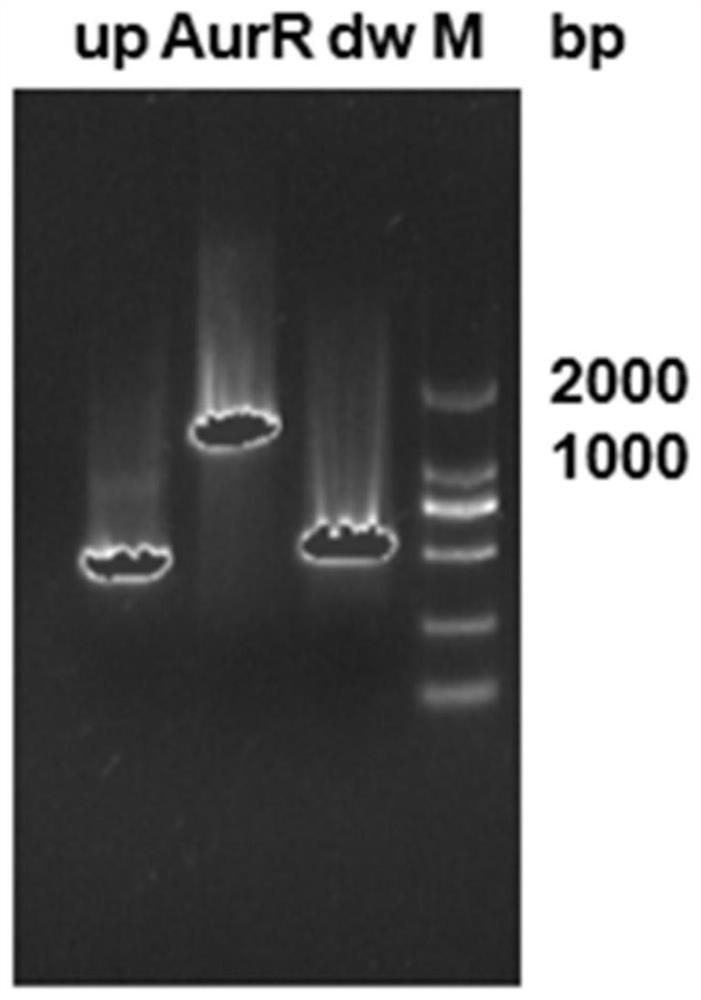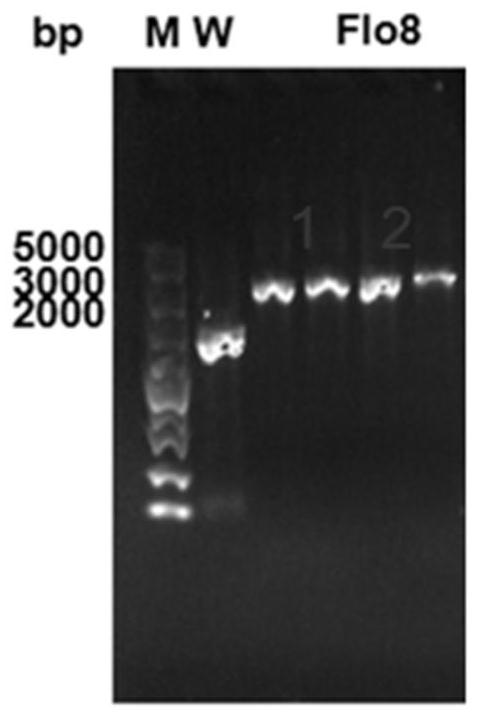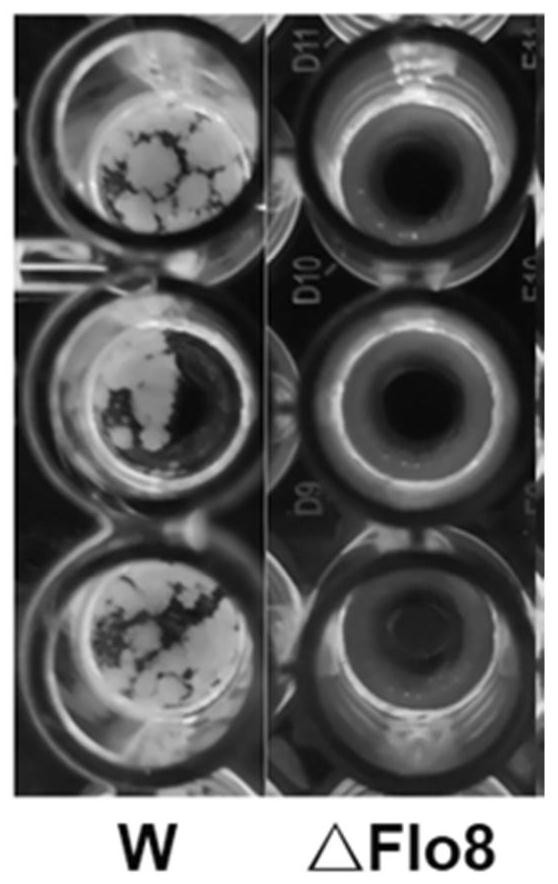A genetically engineered strain of Saccharomyces cerevisiae and its construction method and application
A technology of genetically engineered bacteria and Saccharomyces cerevisiae, applied in the field of genetically engineered bacteria of Saccharomyces cerevisiae and its construction, can solve the problems of weakening the amount of biofilm with flocculation characteristics, large amount of biofilm, strong flocculation characteristics, etc. Increased and reduced flocculation properties
- Summary
- Abstract
- Description
- Claims
- Application Information
AI Technical Summary
Problems solved by technology
Method used
Image
Examples
Embodiment 1
[0029] The primers used in the following examples are as follows:
[0030] AATGAAAGAATCACGGCACG(FLO8-up-F)
[0031] ggtattctgggcctccatgtcCTAACGTCAACTCACCGTG(FLO8-up-R)
[0032] aatgctggtcgctatactgACCTAGATAGAGACAAAAGGCC(FLO8-down-F)
[0033] CGTAGTGGGTTGCATTGGATA(FLO8-down-R)
[0034] ACACGGTGAGTTGACGTTAGgacatggaggcccagaatac (AurR-F)
[0035] GCCTTTGTCTCTATCTAGGTcagtatatagcgaccagcattc (AurR-R)
[0036] 1. Construction of FLO8 gene knockout fragment
[0037] (1) Using the genomic DNA of the original Saccharomyces cerevisiae S288c as a template, the upstream and downstream homology arm amplification fragments of the FLO8 gene were amplified by ordinary PCR (upstream homology arm amplification primer sequence FLO8-up-F , FLO8-up-R are respectively shown in SEQ ID NO:4 and SEQ ID NO:5; downstream homology arm amplification primer sequences FLO8-down-F, FLO8-down-R are respectively shown in SEQ ID NO:6 and SEQ ID NO:6 and SEQ ID NO:5 ID NO: 7); the PCR reaction system is shown...
Embodiment 2
[0060] (1) Take 100 μL of glycerol bacteria S288c (original bacteria) and S288c-△FLO8 (knockout bacteria constructed in Example 1) and add them to 5 mL of sterilized YPD liquid medium for overnight culture and activation;
[0061] (2) According to the inoculation ratio of 10% by volume, transfer the bacterial liquid in step (1) to 100 mL of YPD liquid medium, and continue to cultivate at 30°C and 200 r / min until the OD600 of the bacterial liquid is between 0.8 and 1.2;
[0062] (3) Take 2 mL of the bacterial solution to measure the absorbance value at OD600, and dilute the bacterial solution with sterilized YPD liquid medium so that the OD600 of the diluted bacterial solution is 0.01;
[0063] (4) Take 200 μL of the diluted bacterial solution and add it to a 96-well plate, and use LB liquid medium as a control, and incubate at 37°C for 24 hours;
[0064] (5) Pour out the 96-well plate bacterial solution, buffer with 0.01MPBS buffer 3 times, and pat dry;
[0065] (6) Add 200 μ...
Embodiment 3
[0068] (1) Add 100 μL of glycerol bacteria S288c and S288c-△FLO8 into sterilized 5 mL YPD liquid medium for overnight culture and activation;
[0069] (2) According to the inoculation ratio of 10% by volume, transfer the bacterial liquid in step (1) to 100 mL of YPD liquid medium, and continue to cultivate at 30°C and 200 r / min until the OD600 of the bacterial liquid is between 0.8 and 1.2;
[0070] (3) Transfer the seed solution of step (2) to 100 mL of fermentation medium, which is divided into two types: free fermentation and immobilized fermentation. When immobilized fermentation is carried out, cotton fiber material is added as immobilized material. Add 4g of cotton fiber medium to the medium; ferment at 35°C and 200r / min, and the reaction ends after the glucose is exhausted. Use a spectrophotometer to measure the amount of residual sugar in the fermentation broth at each time period, and use a high-efficiency gas chromatograph to measure the alcohol content in the ferment...
PUM
 Login to View More
Login to View More Abstract
Description
Claims
Application Information
 Login to View More
Login to View More - R&D
- Intellectual Property
- Life Sciences
- Materials
- Tech Scout
- Unparalleled Data Quality
- Higher Quality Content
- 60% Fewer Hallucinations
Browse by: Latest US Patents, China's latest patents, Technical Efficacy Thesaurus, Application Domain, Technology Topic, Popular Technical Reports.
© 2025 PatSnap. All rights reserved.Legal|Privacy policy|Modern Slavery Act Transparency Statement|Sitemap|About US| Contact US: help@patsnap.com



